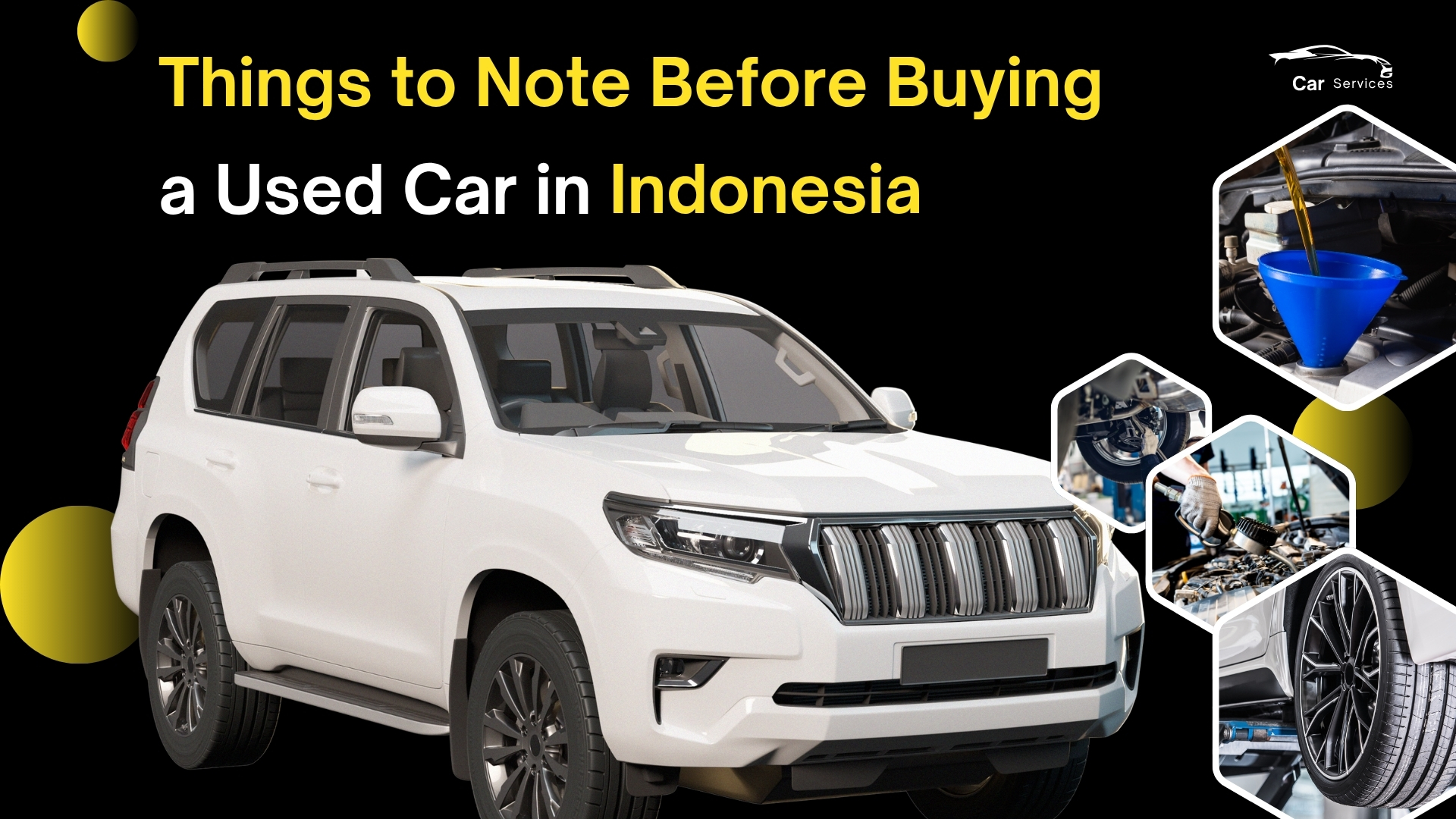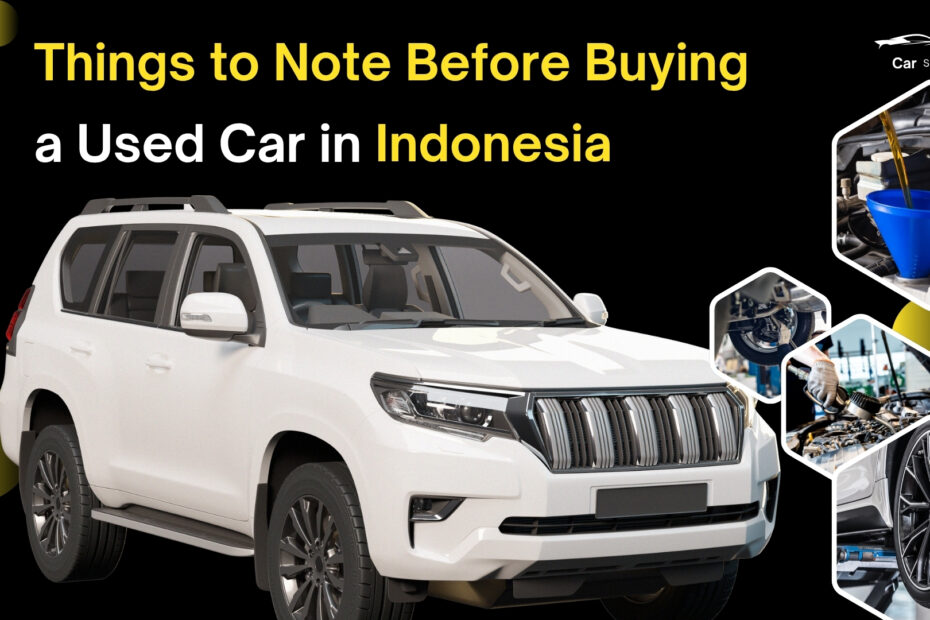Buying a used car in Indonesia can be a smart financial decision, offering significant savings compared to purchasing a brand-new vehicle. However, the process comes with its own set of challenges and risks. From ensuring the authenticity of vehicle documents to checking the car’s mechanical condition, there are several crucial things to note before buying a used car in Indonesia. Whether you’re a first-time buyer or a seasoned car enthusiast, understanding these factors can help you avoid costly mistakes and ensure you get the best value for your money.
In this comprehensive guide, we’ll walk you through everything you need to know before making that important purchase. We’ll cover the legal, financial, and practical aspects of buying a used car in Indonesia, provide a checklist for inspections, compare buying from dealers versus private sellers, and answer frequently asked questions. By the end of this article, you’ll be equipped with the knowledge and confidence to make an informed decision and drive away with peace of mind.
Things to Note Before Buying a Used Car in Indonesia

Understanding the Indonesian Used Car Market
Indonesia’s used car market is vast and diverse, with options ranging from budget-friendly city cars to luxury SUVs. The market is driven by a strong demand for affordable transportation, making it a popular choice for families, young professionals, and expatriates alike.
Key Market Characteristics:
- Wide variety of brands and models: Toyota, Honda, Daihatsu, Suzuki, and Mitsubishi dominate the market.
- Price range: From as low as IDR 50 million for older models to over IDR 500 million for newer, high-end vehicles.
- Sales channels: Authorized dealerships, independent used car dealers, online marketplaces (OLX, Mobil123), and private sellers.
Legal and Documentation Checklist
One of the most critical things to note before buying a used car in Indonesia is ensuring all legal documents are in order. Incomplete or forged documents can lead to legal troubles and financial losses.
Essential Documents:
- BPKB (Buku Pemilik Kendaraan Bermotor): The car’s ownership certificate.
- STNK (Surat Tanda Nomor Kendaraan): Vehicle registration certificate, must be valid and up-to-date.
- Faktur: Original purchase invoice, especially important for newer cars.
- Kwitansi Pembelian: Proof of transaction between buyer and seller.
- KTP (Kartu Tanda Penduduk): Seller’s ID card, must match the name on the BPKB and STNK.
Tip: Always verify the authenticity of these documents at the local SAMSAT office or through the official online verification system.
Mechanical and Physical Inspection
A thorough inspection is crucial to avoid buying a problematic car. If you’re not confident in your technical knowledge, consider hiring a trusted mechanic or using a professional inspection service.
What to Check:
- Engine Condition: Listen for unusual noises, check for oil leaks, and inspect the engine bay for cleanliness.
- Transmission: Test both manual and automatic transmissions for smooth shifting.
- Chassis and Frame: Look for signs of accidents, rust, or repairs.
- Suspension and Brakes: Ensure the car handles well and brakes respond effectively.
- Tires: Check for even wear and sufficient tread depth.
- Interior: Inspect seats, dashboard, air conditioning, and infotainment system.
- Odometer Reading: Be wary of unusually low mileage for the car’s age, as odometer tampering is not uncommon.
Tip: Request a test drive to assess the car’s overall performance and comfort.
Vehicle History and Accident Records
Understanding the car’s history is one of the most important things to note before buying a used car in Indonesia. A car that has been in a major accident or flood can have hidden issues.
How to Check:
- Service Records: Ask for maintenance logs from authorized workshops.
- Insurance Claims: Check if the car has a history of major claims.
- Online Platforms: Some services offer online vehicle history reports for a fee.
Price Comparison and Negotiation
Prices for used cars in Indonesia can vary widely depending on the seller, condition, and location. It’s essential to research and compare prices before making an offer.
Price Comparison Table
| Model | Year | Average Price (IDR) | Dealer Price | Private Seller Price |
|---|---|---|---|---|
| Toyota Avanza | 2017 | 150,000,000 | 160,000,000 | 145,000,000 |
| Honda Brio | 2018 | 140,000,000 | 145,000,000 | 135,000,000 |
| Suzuki Ertiga | 2016 | 130,000,000 | 135,000,000 | 125,000,000 |
Tip: Use online marketplaces to gauge market prices and don’t hesitate to negotiate, especially with private sellers.
Dealer vs. Private Seller: Pros and Cons
Buying from a Dealer
Pros:
- Warranty options
- Easier financing
- Professional inspection and reconditioning
Cons:
- Higher prices
- Limited room for negotiation
Buying from a Private Seller
Pros:
- Lower prices
- Direct negotiation
Cons:
- No warranty
- Higher risk of hidden issues
Financing and Payment Options
Many buyers in Indonesia opt for credit (leasing) when purchasing a used car. Understanding your financing options is crucial.
Financing Options:
- Bank Loans: Lower interest rates, but stricter requirements.
- Leasing Companies: Easier approval, but higher interest rates.
- Cash Payment: No interest, but requires sufficient funds.
Tip: Always calculate the total cost, including interest, administrative fees, and insurance.
Insurance and Tax Considerations
Before finalizing your purchase, consider the cost of insurance and vehicle taxes.
Insurance Types:
- Comprehensive Insurance: Covers theft, accidents, and natural disasters.
- TLO (Total Loss Only): Only covers total loss due to theft or severe damage.
Tax Considerations:
- Annual Vehicle Tax (PKB): Based on the car’s value and age.
- Transfer Fee (BBN-KB): Paid when changing ownership.
Checklist: Things to Note Before Buying a Used Car in Indonesia
- Verify all legal documents (BPKB, STNK, Faktur, KTP)
- Inspect the car’s physical and mechanical condition
- Check vehicle history and service records
- Compare prices and negotiate
- Choose a trusted seller (dealer or private)
- Understand financing and insurance options
- Calculate taxes and transfer fees
- Test drive the car
FAQ: Things to Note Before Buying a Used Car in Indonesia
What documents are required to buy a used car in Indonesia?
You need the BPKB (ownership certificate), STNK (registration), Faktur (invoice), Kwitansi Pembelian (sales receipt), and the seller’s KTP (ID card).
How can I check if a used car has been in an accident?
Ask for service records, check for signs of repair on the chassis and body, and use online vehicle history services if available.
Is it better to buy from a dealer or a private seller?
Dealers offer more security and warranty options, while private sellers usually offer lower prices. Weigh the pros and cons based on your priorities.
What are common scams when buying used cars in Indonesia?
Odometer tampering, forged documents, and selling flood-damaged or accident cars are common scams. Always verify documents and inspect the car thoroughly.
Can foreigners buy used cars in Indonesia?
Yes, but you must have a valid KITAS/KITAP (residence permit) and follow the same legal procedures as Indonesian citizens.
How do I transfer ownership of a used car?
Both buyer and seller must visit the local SAMSAT office with all required documents to process the ownership transfer and pay the relevant fees.
Conclusion: Key Takeaways Before You Buy
Buying a used car in Indonesia can be a rewarding experience if you approach the process with caution and knowledge. The most important things to note before buying a used car in Indonesia include verifying all legal documents, thoroughly inspecting the vehicle, understanding the car’s history, and comparing prices across different sellers. Whether you choose to buy from a dealer or a private seller, always prioritize transparency and trustworthiness.
Remember to factor in additional costs such as insurance, taxes, and potential repairs. Don’t rush the process—take your time to research, inspect, and negotiate. If in doubt, seek assistance from a trusted mechanic or professional inspection service.
By following the steps and tips outlined in this guide, you’ll be well-prepared to find a reliable used car that fits your needs and budget. Safe driving!
